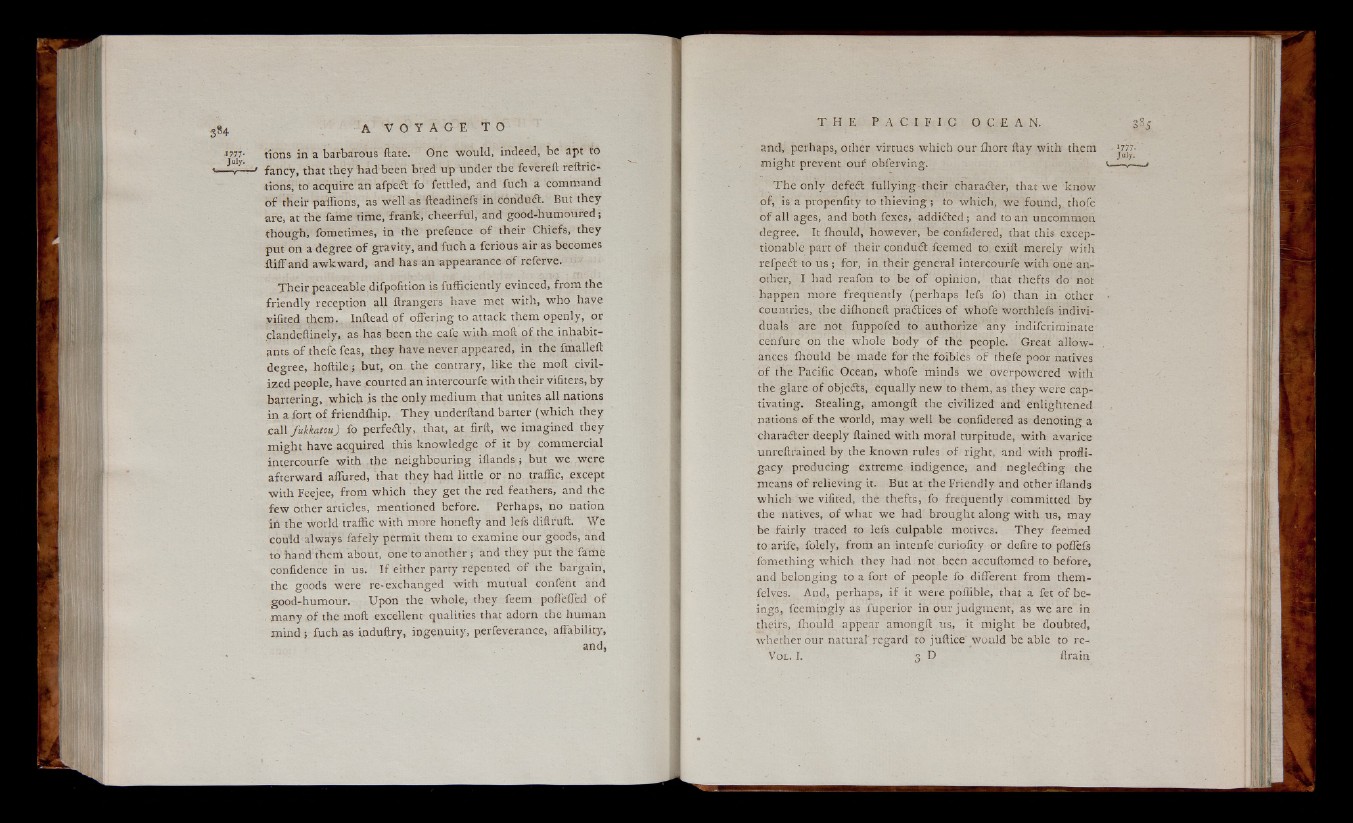
tions in a barbarous ilate. One would, indeed, be apt to
fancy, that they had been bred up under the fevereft reftric-
tions, to acquire an afpeft fo fettled, and fuch a command
of their paffions, as well as fteadinefs in conduct. But they
are, at the fame time, frank, cheerful, and good-humoured;
though, fometimes, in the prefence of their Chiefs, they
put on a degree of gravity, and fuch a ferious air as becomes
ftiff and awkward, and has an appearance of referve.
Their peaceable.difpofition is fufficiently evinced, from the
friendly reception all ftrangers have met with, who have
vifited them. Inftead of offering to attack them openly, or
clandeftinely, as has been the cafij with moft of the inhabitants
of thefe feas, they have never appeared, in the fmalleft
degree, hoftile; but, on the contrary, like the moft civilized
people, have courted an intercourfe with their vifiters, by
bartering, which is the only medium that unites all nations
in a fort of friendfliip. They underftand barter (which they
call fukkatou) fo perfectly, that, at firft, we imagined they
might have acquired this knowledge of it by commercial
intercourfe with the neighbouring iflands ; but we were
afterward allured, that they had little or no traffic, except
with Feejee, from which they get the red feathers, and the
few other articles, mentioned before. Perhaps, no nation
in the world traffic with more honefty and lefs diftfuft. We
could always fafely permit them to examine our goods, and
to hand them about, one to another ; and they put the fame
confidence in us. If either parry repented of the bargain,
the goods were re-exchanged with mutual confent and
good-humour. Upon the whole, they feem poffeljed of
many of the moft excellent qualities that adorn the human
mind ; fuch as induftry, ingenuity, perfeverance, affability,
and,
and, perhaps, other virtues which our lliort ftay with them ‘777-
might prevent our obferving. e—
The only defeft fullying-their charafter, that we know
of, is a propehfity to thieving ; to which, we found, thofe
of all ages, and both fexes, addiited; and to an uncommon
degree. It ffiould, however, be confidered, that this exceptionable
part of their condutft feemed to. exift merely with
refpeci to u s ; for, in their general intercourfe with one another,
I had reafon to be of opinion, that thefts do not
happen more frequently (perhaps lefs fo) than in other •
countries, the difhoneft practices of whofe worthlefs individuals
are not fuppofed to authorize any indifcriminate
cenfure on the whole body of the people. Great allowances
ffiould be made for the foibles 6f thefe poor natives
of the Pacific Ocean, whofe minds we overpowered with
the glare of objects, equally new to them, as they were captivating.
Stealing, amongft the civilized and enlightened
nations of the world, may well be confidered as denoting a
character deeply ftained with moral turpitude, with avarice
unreftrained by the known rules of righr, and with profligacy
producing extreme indigence, and negletfting the
means of relieving it. But at the Friendly and other iflands
which we vifited, the thefts, fo frequently committed by
the natives, of what we had brought along with us, may
be fairly traced to lefs culpable motives. They feemed
to arife, folely, from an intenfe curiofity or defire to poflefs
fomething which they had not been accuftomed to before,
and belonging to a fort of people fo different from them-
felves. And, perhaps, if it were poffible, that a fet of beings,
feemingly as fuperior in our judgment, as we are in
theirs, ffiould appear amongft us, it might be doubted,
whether our natural'regard to juftice would be able to re-
Vor. IV 3 D ftraia